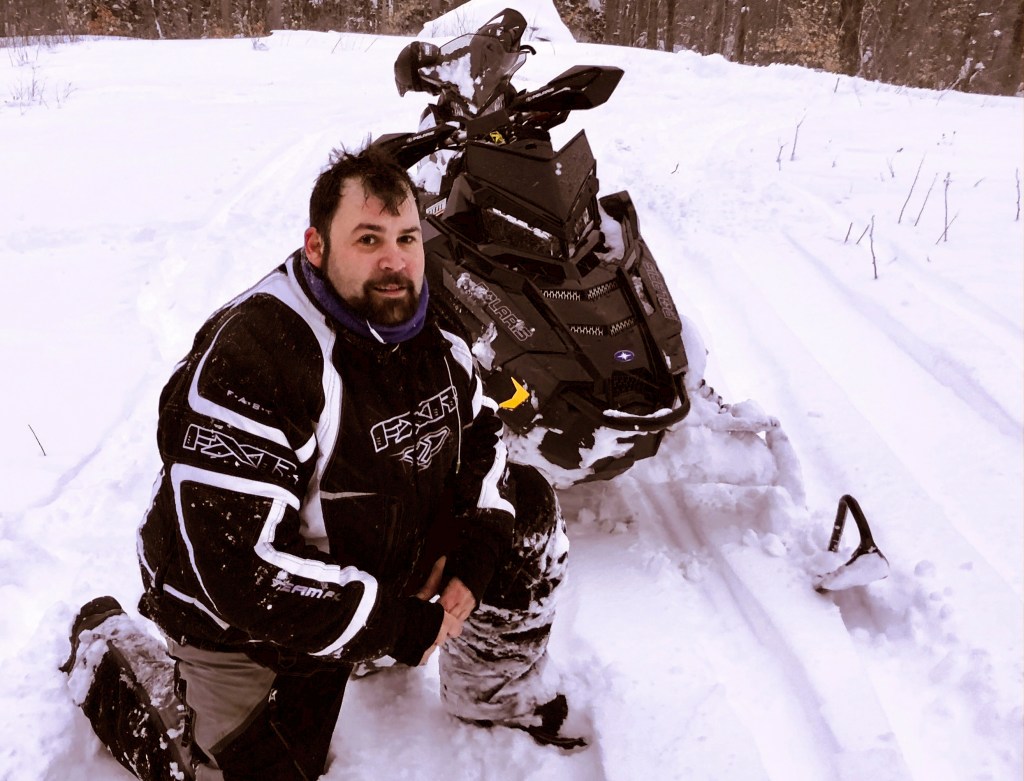Dad who nearly died after crashing snowmobile into Black Hawk chopper blames government in $9.5M suit
A Massachusetts lawyer and dad-of-two who nearly died when he crashed his snowmobile into a camouflaged Black Hawk helicopter is suing the federal government for $9.5 million.
Jeff Smith’s complaint accuses the government of negligence for leaving the 64-foot military chopper on a marked and active snowmobile route at dusk.
On the evening of March 12, 2019, Smith was riding his snowmobile on a trail in Worthington, Massachusetts, when something dark appeared in front of him. He slammed on the brakes but could not avoid clipping the rear tail of the Black Hawk.
Smith was thrown from his snowmobile and his sled went hurtling through the air.
“I found him face down in the snow,” Benjamin Foster, one of the Black Hawk crew members, testified in court. “We rolled him on his back and I might remember yelling or telling one of my crew chiefs to grab some trauma shears and space blankets from the aircraft. … I remember him gasping for breath.”
Smith was airlifted to a trauma center with a dozen broken ribs, a punctured lung and severe internal bleeding.
“It was a mess,” he said.
The 48-year-old married dad-of-two was discharged from the hospital after a month, but he lost the use of his right arm and has not been able to work full-time because of lingering breathing issues.
Nearly five years later, Smith said he continues to struggle with everyday tasks, including putting on socks or pulling up his pants. He also can no longer golf or snowmobile. He receives federal disability assistance and lives with his parents.
“The last five years, there’s been surgery, recovery, surgery, recovery,” said Smith. “Honestly, right now, it feels like I’m in a worst place than when I first had the surgeries in 2019.”
Smith is now demanding millions of dollars in damages from the government to cover his medical bills and lost wages, as well as to hold the military responsible for the crash.
A federal judge in Springfield is poised to rule on the lawsuit later this year.
Smith’s lawyers argued that the crew of the Black Hawk helicopter that flew down from New York’s Fort Drum for night training was negligent for parking the aircraft on a rarely used airfield popular with snowmobilers.
The 14,500-pound helicopter was briefly left unattended without illumination by its crew, who failed to alert snowmobile riders of the Black Hawk’s presence, according to the 11-page complaint obtained by The Post.
The helicopter landed on an airstrip approved by the Federal Aviation Administration — but Smith, who claimed to have snowmobiled on the trail more than 100 times, said the last time an aircraft used it was decades ago, and never a military aircraft.
“Our argument from the beginning has been that it’s incompatible to have a helicopter land on an active snowmobile trail,” said Smith’s attorney, Douglas Desjardins.
“The Army internal investigation showed pretty clearly that the crew knew that they were landing right before or right after on an active snowmobile trail,” Desjardins added. “What bad could happen there? You know, helicopter on a snowmobile trailer where folks go fast.”
The government has repeatedly tried to have the case dismissed, arguing, among other things, that the crew was not told they were landing on a snowmobile trail.
Attorneys for the defendants also insisted that there was nothing in their policies that required them to light up the parked chopper with glow sticks to make it more visible.
“I found no negligence by the crew and believe they complied with all applicable regulations and laws,” according to the Army’s report. “Furthermore, given the particular circumstances of this incident, I am not convinced that using such chem lights or similar devices would have prevented the collision.”
The government tried to lay the blame on the victim, claiming that Smith was driving his snowmobile at a speed of more than 65 mph after taking prescription pills and washing them down with two beers.
Smith confirmed that the night of the accident, he had a beer over dinner at his mom’s house – and another one with his dad, before setting out on his snowmobile to meet up with his brother, Richard Smith, on the trail.
After he went over a ridge, he said his headlights reflected off “something”– but he did not know it was a military helicopter until he struck it.
“As soon as I heard that somebody on a snowmobile hit the helicopter, I knew it was my brother,” Richard Smith, Jeff’s brother, said. “My heart hit my stomach. I just knew it was him. I went down there and my father told me he was alive. I didn’t sleep that night. I spent that night on my knees praying.”
Jeff Smith said winning the lawsuit against the federal government and collecting damages would allow him to pay for a procedure that attaches an electronically-controlled brace that would improve movement in his left arm.
“It would change my life,” he said. “I would certainly be able to function and it would easier to do the daily activities of daily life like brushing my teeth, taking out the trash and opening door with one hand.”
Smith also sued the owners of Albert Farms airfield, accusing them of both giving permission to snowmobilers to use the trail and the Black Hawk crew to land in the same area. That lawsuit was settled for an undisclosed amount.
With Post wires

















